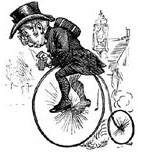
“Ed Speak” Invades Catholic Schools
AD MAJOREM MUNDI GLORIAM
A passerby might be surprised to turn the corner and come upon this 19th-century architectural landmark with its wrought iron railings and columned entryway. The impressive structure stands in sharp contrast to the surrounding neighborhood of shabby public housing units, and what one finds upon entering it is even more exceptional.
This historic building is the setting for a rare educational gem — an inner-city Catholic high school offering a classical education to bright, hardworking students from a wide range of ethnic and socio-economic backgrounds. They teach Latin and Greek here, and there are three daily Masses in the chapel. It’s a school where the students ask for more homework and mean it. The 400-year tradition of Jesuit pedagogy and curriculum has guided the school to this success.
In the teachers’ lounge, hope should abound. Instead there is anxiety, as accomplished teachers find themselves battling a horde of barbarians with doctorates in Education, state-certified professionals and “experts” who have come to tear down a classic curriculum and discard proven teaching methods. They are here to bring to a traditional Catholic school the same modern pedagogy that has worked its wonders in our public schools. Such is the school in which I recently taught.
I am the product of 13 years of Jesuit education, and when I went looking for a high school teaching job I set my heart on teaching in a Jesuit school. Interviewing here and there, I found that initial enthusiasm for my qualifications was dampened by the discovery that none of my degrees was in education and my portfolio contained no state-issued teaching license.
You May Also Enjoy
If this exam seems easy, you might want to try it out on your local Catholic-school eighth-grader or high-schooler.
Even the brightest graduates of diocesan Catholic schools are idiots.
Students, a new cohort of faithful faculty members, and orthodox bishops are beginning to pay more attention to what is happening on Catholic campuses.

